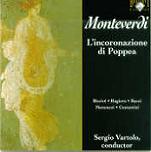Recorded live in Corsica in December, 2004, this eccentric performance occasionally has fine moments but ultimately has too much going against it. The instrumentalists are few (the ensemble is not named, but the 12 players are), and they play vividly, embellishing their lines with skill and only to underline the drama. The singers do the same thing. The tempos chosen by conductor/cembalist Sergio Vartolo are painfully slow–presented complete, the opera takes more than four hours to get through–and while that does allow the singers to express themselves well, the overall effect is stultifying. And that’s not the greatest problem.
In the copious notes accompanying the set we learn about the various editions of this opera, and there is much speculation. None of it really matters much except that Vartolo has assigned the role of Nerone to a woman (the colorful Liliana Rugiero) for the first and third acts, and to a tenor (the equally good but simply wrong Giampaolo Fagotto) for the second. It’s a foolish and senseless decision, despite claims that a man sounds better with Lucano in the drinking duet. In addition, Arnalta is sung by a woman and not a man in drag (other conductors do the same, but it’s wrong and not nearly as effective), and Ottone, invariably a countertenor or mezzo-soprano (though the former is better), here is the Rossini tenor William Matteuzzi, who sings the role in falsetto. It’s very odd.
A soprano named Angela Bucci has an interesting, wiry sound as Fortuna, but she also sings Ottavia and lacks gravity. The Poppea, Patrizia Biccirè, is nicely seductive, even if the tempos make her seem lethargic. Raffaele Costantini offers a rich bass (complete with low-C) as Seneca, however he seems even a duller pedant than usual at these speeds. A complete Italian-English libretto is included, the sound is superb, and the price is amazingly low–but this set makes little sense, and it drags and drags. The Harnoncourt on Teldec is still the best, with Gardiner on DG a close second.
































